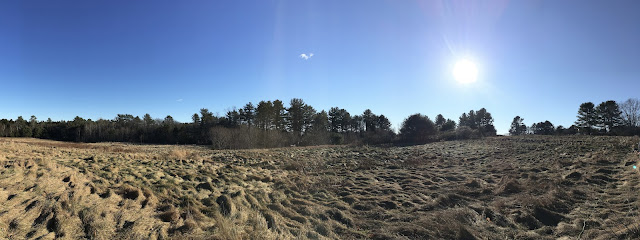I was going to write about why I haven't been writing much (instead, busy with running, some autumn gardening, taking care of a recently-sick Calvin, and doing online modules to complete my DSP (direct support provider) "training" so that I can begin being paid a little for taking care of Calvin. I was going to write about the fact that, on a moderate dose (100 mgs) of Calvin's newest drug, Xcopri (cenobamate), he's been going longer between seizures (thus having fewer), and that he didn't have a fever or a febrile seizure after last Friday's Covid booster. I was going to mention that he hasn't had any focal seizures since February, and that, overall, his behavior is better.
I was going to write about our near-perfect trip to the Cumberland County Fair yesterday where, under hazy, lavender-ish skies, Calvin did some amazing, albeit brief, stints walking by himself (too good to be true? we wondered aloud) down and back through a barn of draft horses and even a bit further. I was going to write about how straight and stable he sat at a red picnic table drinking from his sippy cup, that he enjoyed bites of warm, cinnamon-sugar donut, that all day long he signed "eat" very well, putting his finger to his mouth when he wanted more.
But, halfway through our time at the fair, when the crowds began to gather choking the pathways, and the midway rides ignited their noisy motors, and the hot sun began to filter through a bit too strong, Calvin's relative well-being seemed to go south. His intermittent walking deteriorated, so we put him back into his stroller. His skin felt hot. His face went pale. He began to perseverate, elbows crooked and waving, knitting his fingers. On the drive home, he batted and grabbed for me incessantly as if to be saved from something.
Then last night came the perfect storm—the new moon, a drop in the barometric pressure, perhaps a semi-latent affect from Friday's Covid booster, the sky opening up to unleash one of the hardest downpours I've heard since moving here—and at 2:45 this morning, Calvin had a grand mal seizure. It had been fifteen days since the last one. This time, when the fit was over, I gave Calvin twice as much of my homemade THCA cannabis oil as I usually do, hoping to prevent a second one from striking like they often do. Thankfully, it seemed to work.
As I laid in bed next to my boy in the pitch black of his room, I thought about the day's events and the looks Calvin got from strangers—some kind, others curious or suspicious, perhaps even put-off. I thought about the rides I would've liked to have taken him on, the animals I wish I knew if he saw and wish he could enjoy petting, the contests I wish he could've entered if he wanted to, the fact that, in ways, Michael and I wish we could've been at the fair without him.
As Calvin slept, at times arching, I thought about our ride home through parts of Freeport, Maine, where good neighbors and authorities were and are actively searching for a skinny fourteen-year-old boy named Theo who went missing four days ago wearing shorts and flip flops as nights dip into the forties and fifties. I wondered what happened to him. Was he snatched up by a nefarious actor? Did he fall into a hole or into frigid waters? Was he bullied into a state of anxiety, depression or some sort of submission? Did he end his own life? Was he trying to escape something or someone?
Then, I thought about the bluegrass concert given at my friends' gorgeous farm last Friday night in memory of their young and precious son, Finnegan, who died in a kayaking accident last November. So many amazing and loving people gathered together to make food, music, and memories in honor of a beautiful boy—at nearly 24, a young man, really—who was lost far too soon. I felt grateful to have been able to be there, at least long enough to give and get some hugs, to visit with beloveds a bit, and to remember my young friend, Finnegan, for the incredible human being he was.
In thinking about Theo and Finnegan, I considered the grief I feel over my own lost boy. I often wonder what would have become of Calvin—or what he would have become—if he hadn't been born missing most of the white matter in his brain. I mourn the loss of a boy who is flesh and blood sitting right in front of me—the loss of his artistic, athletic, academic, physical, philosophical, humanitarian potential. The loss of seeing him make friends and meet new people, and of us becoming their close friends, too. The loss of seeing him fall in love. The loss of the potential of having a growing relationship with our adult child. The loss of possibly having a grandchild or two to dote on.
Then, I think about my blog and memoir in progress and how I'd never have started writing them if not for my boy. Perhaps I wouldn't be quite so charmed by gardening if I didn't feel the need to shape nature since I can't control my son's regrettable disabilities and miserable afflictions. Maybe I'd never have started running (again) if not for need of an escape from a hard and restricted life of mothering an impossible infant-toddler-teen. Maybe I'd never have embarked on my pandemic back roads travels, which have bore new friendships, sparked a love for taking copious panoramic photographs, caused me to reflect so deeply on life and the mundane. These amazing endeavors I'd likely never have chanced upon if not for Calvin.
And though it's no consolation, my lost boy and what he has brought to me and to others is so worthwhile, and worth pondering.




















